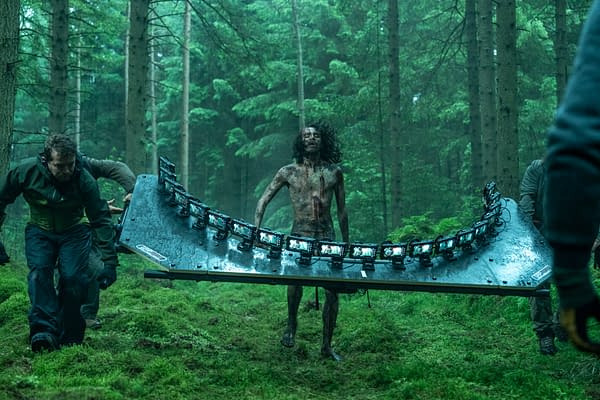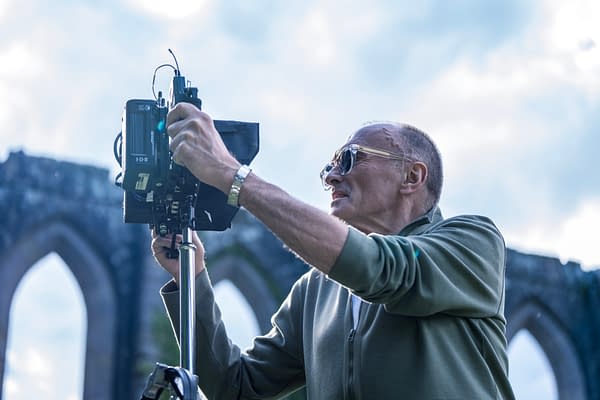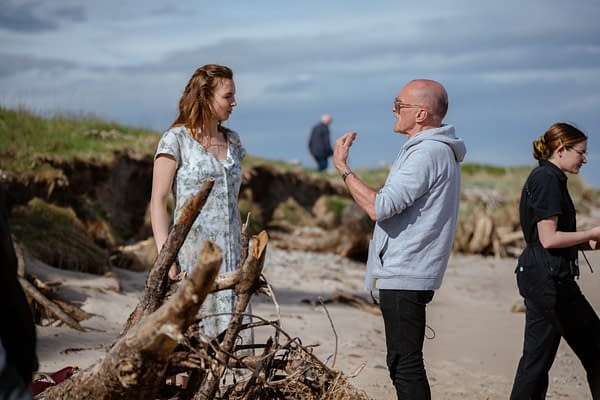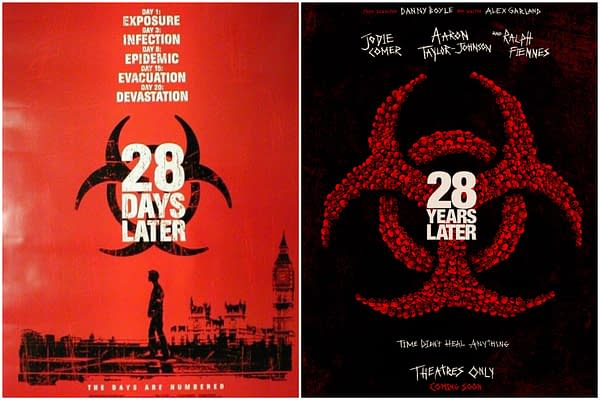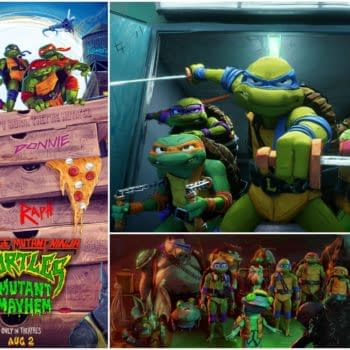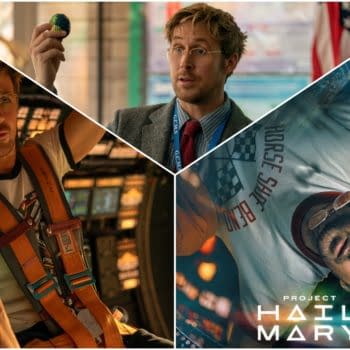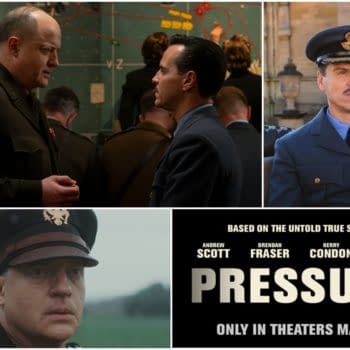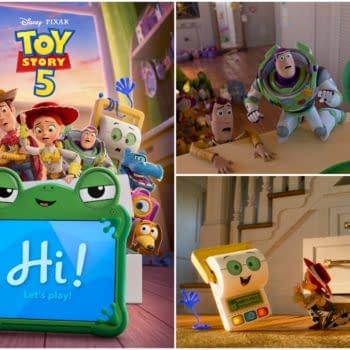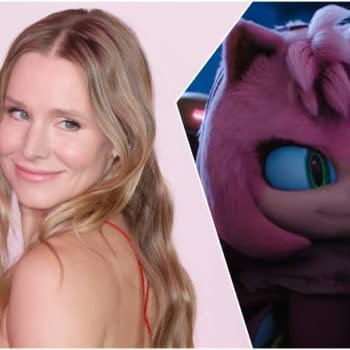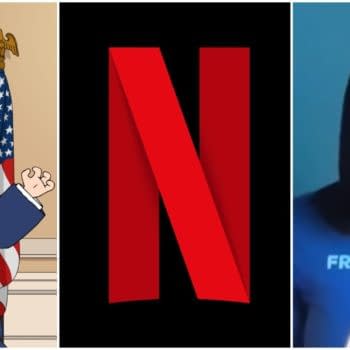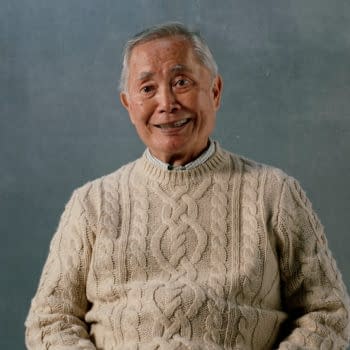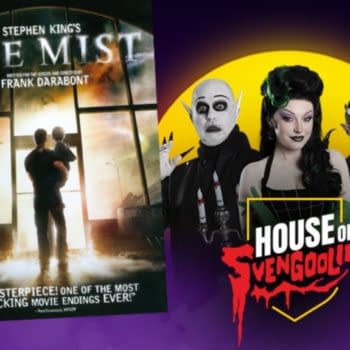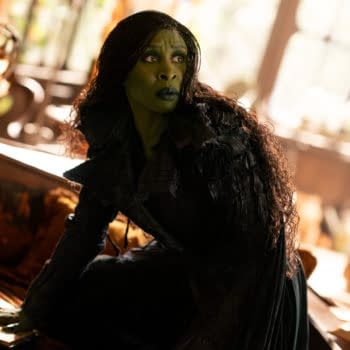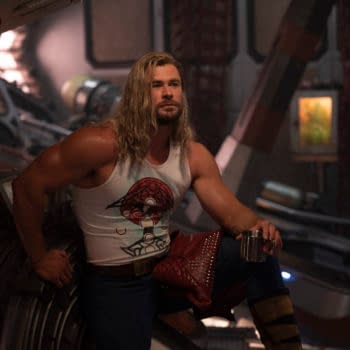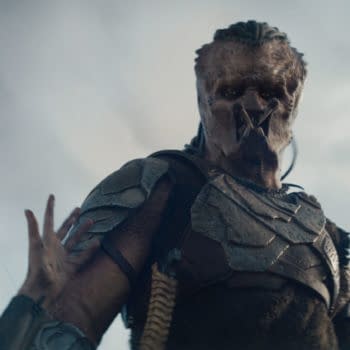Posted in: Exclusive, Movies, Sony | Tagged: 28 years later, alex garland, danny boyle
28 Years Later: Director Danny Boyle And Alex Garland Interview
28 Years Later director Danny Boyle and writer Alex Garland discuss politics, the island's culture, and new technology.
Article Summary
- Danny Boyle and Alex Garland break down the political themes driving 28 Years Later’s story and characters.
- The filmmakers discuss the cultural shifts that prompted their return to the post-apocalyptic saga.
- New filmmaking technology, including innovative drone shots, played a key role in shaping the film's visuals.
- Creative risks and bold narrative choices challenge expectations in this ambitious sequel to 28 Days Later.
28 Years Later is wrapping up its second weekend at the box office and has passed $100 million at the worldwide box office. The conversations around the film have been interesting to say the least, with people having strong opinions one way or another. Director Danny Boyle and writer Alex Garland clearly put a lot of thought into the nuance of this world, but when you subvert expectations, some people might not like what they see. We got the chance to speak to Garland and Boyle right before the movie came out, and here is the full interview. And yes, I did fangirl a bit at the end, these are two of my favorite directors and writers of all time, I'm only human.
Bleeding Cool: These movies have always been deeply political and there have been so many massive culture and political moments in the last decades that have followed them, What was it about the present culture, present current political and cultural climate that really inspired you both to come back and explore this world again, after people have been asking you to come back for like two decades?
Alex Garland: Just speaking for myself, on the political front, I would say that a lot of the time I was growing up, life was defined by a concept of progression and looking forward, and there being some very important lessons that had been learned and were so important that they seemed unforgettable. And then over the last 10 to 15 years, a kind of concept of regression has really taken hold of looking to the past and values of the past or just a conceptualization of the past and how it is that progressive thinking has been replaced in an attractive way, at least in many respects, by regressive thinking, and then what form that regressive thinking takes.
Alex Garland: And to me, it seemed pretty obvious that, or at least alarming, one of the features was amnesia. So there'd be all sorts of things about the past that were simply forgotten or excised from memory for one reason or another. But it could be just as simple as forgotten. The lesson did not stick around. Or the memory could be very selective. So you'd remember one kind of thing, but not the kind of things that came along with it. Or it would be misremembered. So something would be remembered from the past that didn't actually really exist. And because Danny and I are both old enough to have a memory of the past, as well as a sense of the past that is being misremembered or misrepresented, that certainly played into my thinking within this story. There's actually a speech in the second movie that nails this. Slightly more clearly, but in a sort of ironic way. But yes, if you're specifically asking politically, it would be that.
- An infected with the barcam on the set of Columbia Pictures' 28 YEARS LATER. Photo By Miya Mizuno © 2025 CTMG, Inc. All Rights Reserved.
- Director Danny Boyle on the set of Columbia Pictures' 28 YEARS LATER. Photo By Miya Mizuno © 2025 CTMG, Inc. All Rights Reserved.
- Jodie Comer and Director Danny Boyle on the set of Columbia Pictures' 28 YEARS LATER. Jodie Comer and Director Danny Boyle on the set of Columbia Pictures' 28 YEARS LATER. Photo By Miya Mizuno © 2024 CTMG, Inc. All Rights Reserved.
- L-R: Photo Courtesy of Sony Pictures © 2003 CTMG, Inc. All Rights Reserved. | Photo Courtesy of Sony Pictures © 2024 CTMG, Inc. All Rights Reserved.
Bleeding Cool: Was that why it was so important to have essentially two generations represented in terms of your characters? Because you've got Jamie and Ilsa representing the people who remember what was like before the virus. And then you've got Alfie represented.
Alex Garland: I'd say two cultures rather than two representations. So you've got a culture on the island which is created, and has some features of misremembered past about it. And then you've gotten another culture which is really represented by one person who's a kind of inverse Kurtz, who appears to be like Colonel Kurtz from Heart of Darkness or Apocalypse Now, sort of superficially. Surrounded by bones and perceived as being crazy and things like that but actually what he is is very compassionate and very thoughtful and actually very different from the community that Spike has left and amongst other things for example the bones in his temple are not differentiating between people who have been made sick through infection or not. So I would see it as cultures rather than generations.
Danny Boyle: And he's not out slaughtering people, which is, well, Jamie teaches his son to slaughter, you know, as the protective method, Kelson's is much more… you'll find out more about that in the second film.
Bleeding Cool: Yeah, Danny, I only have a little bit of time left, but Danny, you've spoken a little bit about the iPhone rig. Were there any other new tech elements that you got to play with in this movie that you were excited to play with?
Danny Boyle: Oh yeah, there's a drone called a howler.
Bleeding Cool: I love tech stuff, so please tell me anything you want to say about tech stuff.
Danny Boyle: I don't know that it's actually technically called. We called it the howler because it makes a lot of noise. But it is safe because the problem with drones is, increasingly, it meets the edifice of health and safety, that says 'oh now you can't fly there because that'll be above these people and it should it by chance fall, it might hit someone,' you know all this kind of stuff. So they invented these things called the howlers, which are these tiny little drones which you can fly around the room like you're in now, and they might bump into you, but they won't hurt you when they bump into you. They're just more like a big, a very big blue bottle — boff! — that bumps into you. But you do get extraordinary moments out of them. They're kind of like an experiment, you know?
Danny Boyle: But we do use drones a lot, actually. And I think that they have a reputation of being separate from the production, you know, that you'll get your big wide shot with a drone. But I think that's going to compress that distance between regular footage and drone footage. And actors are going to pick them up, and then let them go. They'll interface much more with the regular coverage that you make. So that was very exciting to use some of that material. Quite a few of the shots, nobody would ever know they were done on a drone, I think. So yeah, that was very exciting. It's lovely. Horror gives you a chance. You know, you can take these risks with horror. It's a lovely, freeing environment, technically. You know, you can you can challenge conventions, and resolution, and format. We used a very unusual format on it, very wide screen format, 276. That was lovely to do; it was a lovely world to be in, technically.
Bleeding Cool: Alright, well, I got the wrap up. Thank you guys so much for taking the time to speak to me. If I may, you're both two of my favorite writers and directors of all time, Annihilation and Sunshine are incredible.
Danny Boyle: Ah, right, thanks very much.
Bleeding Cool: This movie was fantastic.
Danny Boyle: Can I just say in return, Kaitlyn, I liked you so much, I named my daughter after you.
Bleeding Cool: Similar spelling? Because I have a very unconventional spelling.
Danny Boyle: Do you do it with a K?
Bleeding Cool: Yes, I do it with a K and a Y.
Danny Boyle: A K and a Y, no, she's a C and an I, anyway. No matter, thank you.
Bleeding Cool: Thank you.
28 Years Later: Summary, Cast List, Release Date
Academy Award®-winning director Danny Boyle and Academy Award®-nominated writer Alex Garland reunite for 28 Years Later, a terrifying new "auteur horror" story set in the world created by 28 Days Later. It's been almost three decades since the rage virus escaped a biological weapons laboratory, and now, still in a ruthlessly enforced quarantine, some have found ways to exist amidst the infected. One such group of survivors lives on a small island connected to the mainland by a single, heavily-defended causeway. When one of the group leaves the island on a mission into the dark heart of the mainland, he discovers secrets, wonders, and horrors that have mutated not only the infected but other survivors as well.
28 Years Later, directed by Danny Boyle, stars Jodie Comer, Aaron Taylor-Johnson, Jack O'Connell, Alfie Williams, and Ralph Fiennes. It was released on June 20, 2025.


